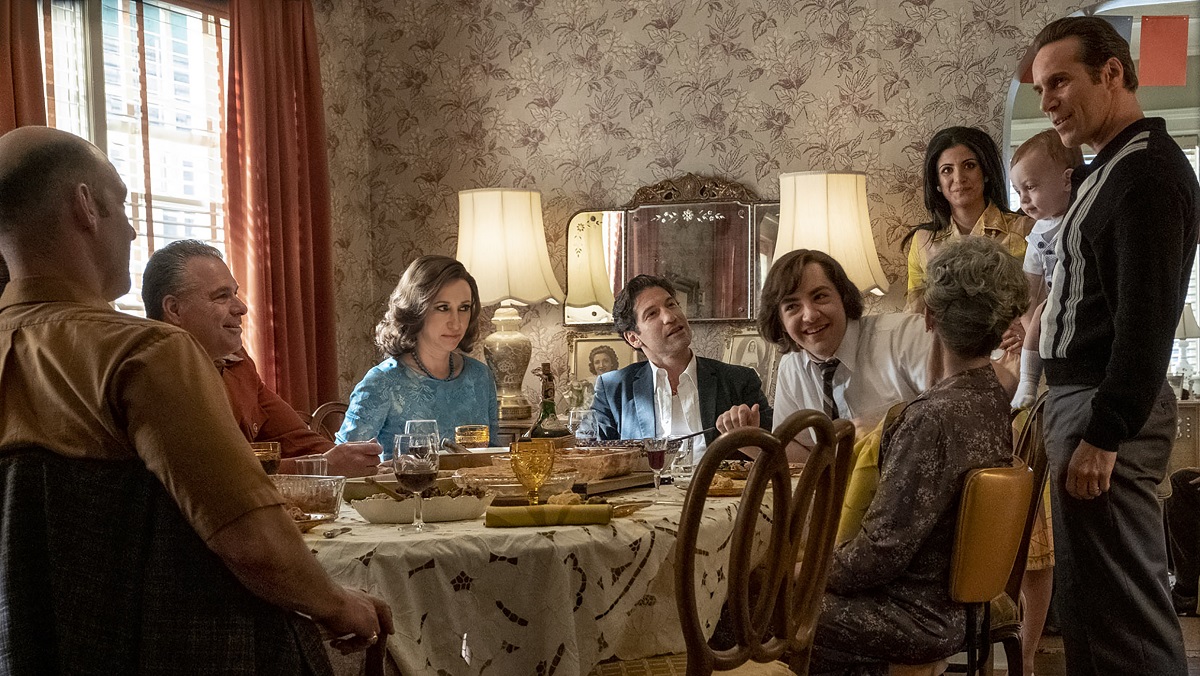By the time one of cable TV’s most acclaimed series ended in 2007, the entire landscape had changed. HBO had become a titan of edgy hour-long dramas as we entered the so-called New Golden Age of television. But after so much time, and so many other great shows, I legitimately wondered if I’d care to revisit The Sopranos universe again 14 years later. Especially after the tragic passing of James Gandolfini in 2013. With the new prequel movie The Many Saints of Newark, the answer quickly became an emphatic “yes.” However, I’m not sure a two hour movie truly does justice to David Chase’s rich and complicated world of gangsters and family.
Many Saints sets out to be a sprawling, decades-spanning mob epic in the vein of Goodfellas or The Irishman (very Scorsesesque), nominally focusing on the figure of Dickie Moltisanti (Alessandro Nivola). Dickie Moltisanti, the father of Christopher Moltisanti, Tony Soprano’s “nephew,” is a somewhat mythical figure whom we hear about a few times in the series. Beginning in the 1960s and ending in the mid-’70s, the film deals with Dickie’s personal demons as well as his professional rivalry with Harold McBrayer (Leslie Odom, Jr.), a former employee who decides to strike out on his own, with deadly results.

Warner Bros.
The best stuff in the movie squarely focuses on Dickie and Harold. Dickie is a “made” guy with a wife and a girlfriend and a new son. He’s doing pretty well for himself, but feels a need to do good deeds to offset all the evil he does. One of these good deeds is to try to set his nephew Tony (played as a teenager by Michael Gandolfini, James’ son) on the path away from the mafia. Tony’s father Johnny (Jon Bernthal) is in and out of prison and is just generally not the best role model.
Harold, meanwhile, has to deal with scraping by, handing over numbers money to Dickie from the Black neighborhoods in Jersey. He gets no respect, and following a brief exile, he returns with the desire to make his own business, which does not sit well with Dickie and the Italians. This all happens in the middle of real-life race-based protesting and rioting following (go figure) white Jersey policemen unjustly beating a Black cab driver.
Warner Bros.
This tension builds very nicely throughout the first part of the movie, with Dickie’s conscience and pride getting in the way of each other as he simultaneously tries to put down Harold’s attempted takeover and putting Tony on the legitimate life path. The trouble is, of course, that at a certain point, the movie starts to focus on Tony, to the detriment of Dickie’s storyline, and to the almost total removal of Harold’s.
I absolutely understand why this happened. If you’re making a movie about beloved TV characters 30 years earlier, you’re going to want to spend some time with them. Initially, characters like Junior Soprano (Corey Stoll), Silvio Dante (John Magaro), and Paulie Walnuts (Billy Magnussen) play support to Dickie, as it ought to be. It’s his movie, isn’t it? Later, the focus shifts to Tony and his relationship with his mother Livia (Vera Farmiga), which played such a major part in the early seasons of The Sopranos. And this would be fine, if the movie had more time to breathe.
Warner Bros.
A movie aiming for the kind of character depth as an 86-episode TV series is going to have to cut some corners. Obviously. But the problem for me is that, at only 2 hours, it felt like glancing blows at a complete story. It feels as though the latter half of the movie sacrificed things that were necessary for the movie at hand in favor of giving us more of an origin for Tony Soprano. The ending, as a result, feels anticlimactic and a bit cheap in a way that the material doesn’t warrant.
Make no mistake: everything on screen is outstanding. Alan Taylor’s direction sizzles and there are moments of genuine tension. The entire cast is brilliant, with particular standout performances by Nivola, Farmiga, Odom, and MVP Ray Liotta. Each and every scene is excellent. The problem is, by the end of the movie, you feel like you haven’t seen enough. There’s way more story than the runtime allows. And while it’s fun to go “oh hey, a young Artie Bucco!” I’d have loved less of that if it meant more focus.
Warner Bros.
Let us not forget Goodfellas is nearly two and a half hours; The Irishman is nearly four. A story like this, with this robust roster of characters, deserves to have an epic runtime. My guess is, given this is a split release between theaters and HBO Max, Warner Bros. got cold feet, presuming a longer runtime would scare some ticket buyers away.
After The Sopranos ended, I didn’t think I ever needed to see these characters again. Five minutes into The Many Saints of Newark, I knew I was wrong. This is a universe of fabulously nuanced, morally imperfect, and ultimately tragic people that immediately spring to life with superb acting and dialogue. We just don’t get enough for it to feel satisfying. Like a spread without gabbagool.
3 out of 5
Kyle Anderson is the Senior Editor for Nerdist. You can find his film and TV reviews here. Follow him on Twitter!